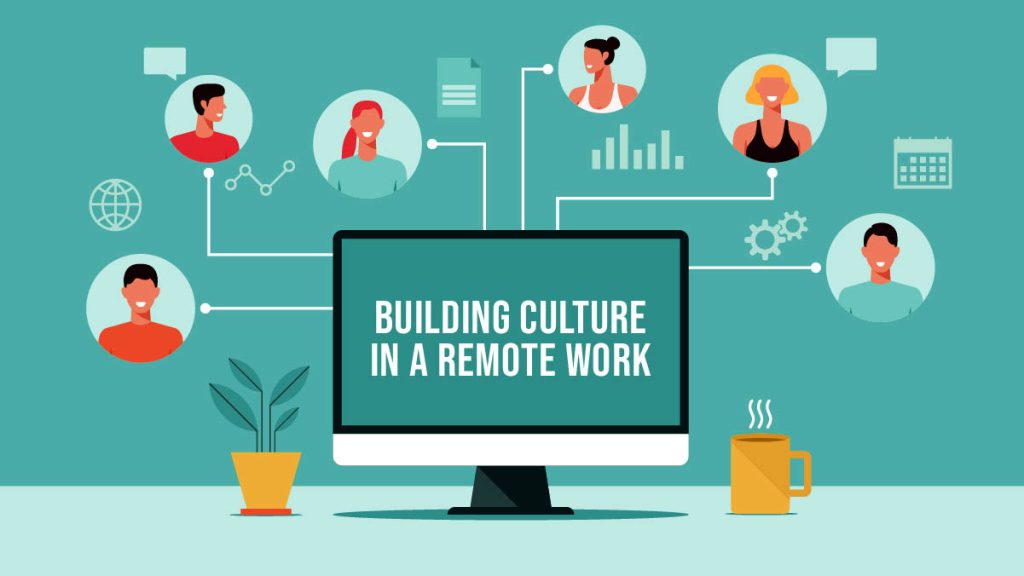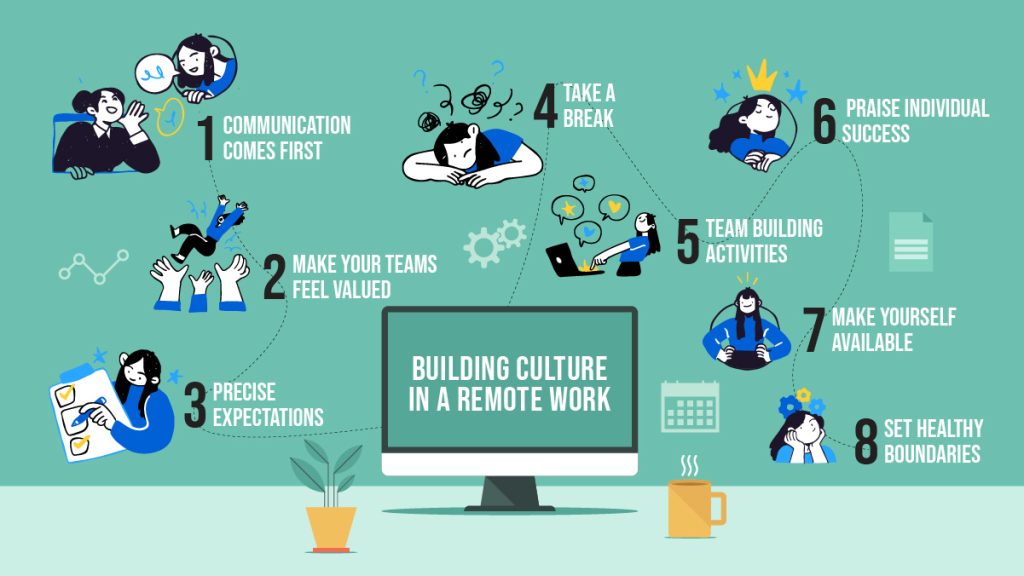
In light of recent world events, we got introduced more to remote work after the world had to adapt to a pandemic. Massive names have gradually shifted to remote work, and now they set the standards for remote work across the globe, taking the phrase “this meeting could’ve been an email” to a new level. So, this poses the question: how to build a remote work culture?
Eight Essentials to Build and Maintain a Remote Work Culture
Many companies still struggle to build a remote work culture and help their employees transition to the new setting. Here are eight keynotes to help you with your remote work culture.
- Communication comes first
Communication is at the center of almost every successful thing. It is a productivity booster so try to have lots of meetings and ask for direct reports. Communicating will ensure that specific departments’ goals align with the company’s goals. Try to engage in a type of social communication as well. Pushing workers to their limits can be daunting, so finding time to check on them will go a long way.
- Make your teams feel valued
Everyone needs to find meaning in what they do, and employees are no different. Make sure to make them feel valued and remind them of their achievements, incentivizing them to work harder and accomplish more. Praise and encourage them, and try to include them in decision-making, making them feel like a valuable part of the organization.
- Precise expectations
Be clear with your expectations. It’ll help you know how you will evaluate them and what they need to deliver. Additionaly it is a crucial thing, especially in a remote work environment. Clear expectations can be motivating and guiding. People will perform better when they know what’s asked of them.
- Take a break
Ideally Include time for fun, relaxing, and charging their batteries. Remote work can be very draining; don’t think that since they are home, it can’t get too much at any time. Help them feel more connected by organizing fun activities like a game night.

- Team building activities
Don’t just stick to zoom calls and virtual meetings. The best company culture usually involves lots of team-building exercises. Include activities that will promote trust and build chemistry between coworkers.
- Praise individual success
In a remote work culture, many employees might feel left out. While it can be an individualistic process, but sometimes take your time to notice individual success. Focusing on the team aspect doesn’t have to mean ignoring what makes certain employees special.
- Make yourself available
Moreover, being available to help can be huge for promoting a healthy work culture. Your team might need to discuss some issues with you or seek problem-solving advice. Try to be there as much as possible. It will make your presence well known. Watch out, though, don’t micromanage. It won’t get you anywhere.
- Set healthy boundaries
Finally, discuss boundaries that will ensure everyone knows their side of the fence. The lines can get foggy in a remote work environment. Once you make your points clear, they become embedded in the work culture and will help define the organization’s structure and promote a healthy dynamic within a respectful flow.
Company Culture Example: Japanese Work Culture
Japanese work culture can present an example of an extreme since it can be perceived as a toxic work culture sometimes. Exhausting work hours, workers in Japan are often not encouraged to take days off and it’s looked down on. A particular set of rules or etiquette has to be followed and maintained with a high level of politeness.
Unfortunately Japanese work culture has brought an epidemic of loneliness and depression across the country. Almost a quarter of suicides are work-related. Financial pressure and toxic work culture push individuals beyond their limits. Unfortunately, the stoic Japanese culture is an obstacle to seeking professional help or speaking out. They often just told to rest, and the problem will resolve itself by tomorrow.
However ,The government tried to address these issues with an initiative in 2017 by encouraging workers to relax and even leave early on a designated Friday of each month. Still, unluckily companies didn’t take kindly to the enterprise, with some employees reporting that they had to work on weekends to make up for time wasted.
Final Thoughts
Finally, doing too much can have adverse effects, unlike what you desire, so make sure you don’t overthink it. Proper research will help you find an organic process that will help you build your remote work culture. Balance is vital to avoid radical approaches and always seek a perfect mix between hard work and mental health. Efficient work doesn’t have to come with a heavy price, such as your health or worker’s health. Make sure the work culture you’re trying to build reflects a space you would have loved to be a part of as an employee.
Inside Telecom provides you with an extensive list of content covering all aspects of the tech industry. Keep an eye on our Startups sections to stay informed and up-to-date with our daily articles.